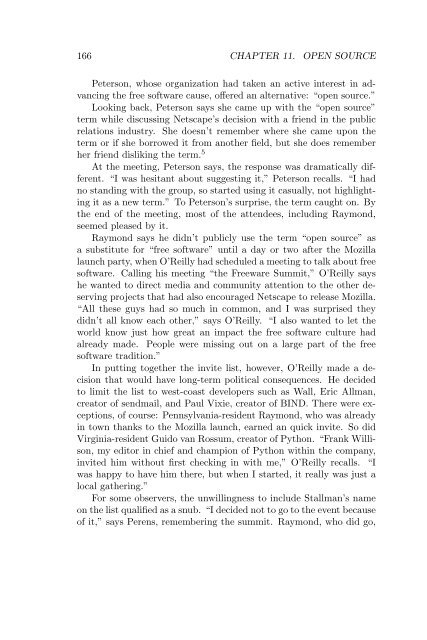Create successful ePaper yourself
Turn your PDF publications into a flip-book with our unique Google optimized e-Paper software.
166 CHAPTER 11. OPEN SOURCE<br />
Peterson, whose organization had taken an active interest in advancing<br />
the free software cause, offered an alternative: “open source.”<br />
Looking back, Peterson says she came up with the “open source”<br />
term while discussing Netscape’s decision with a friend in the public<br />
relations industry. She doesn’t remember where she came upon the<br />
term or if she borrowed it from another field, but she does remember<br />
her friend disliking the term. 5<br />
At the meeting, Peterson says, the response was dramatically different.<br />
“I was hesitant about suggesting it,” Peterson recalls. “I had<br />
no standing with the group, so started using it casually, not highlighting<br />
it as a new term.” To Peterson’s surprise, the term caught on. By<br />
the end of the meeting, most of the attendees, including Raymond,<br />
seemed pleased by it.<br />
Raymond says he didn’t publicly use the term “open source” as<br />
a substitute for “free software” until a day or two after the Mozilla<br />
launch party, when O’Reilly had scheduled a meeting to talk about free<br />
software. Calling his meeting “the Freeware Summit,” O’Reilly says<br />
he wanted to direct media and community attention to the other deserving<br />
projects that had also encouraged Netscape to release Mozilla.<br />
“All these guys had so much in common, and I was surprised they<br />
didn’t all know each other,” says O’Reilly. “I also wanted to let the<br />
world know just how great an impact the free software culture had<br />
already made. People were missing out on a large part of the free<br />
software tradition.”<br />
In putting together the invite list, however, O’Reilly made a decision<br />
that would have long-term political consequences. He decided<br />
to limit the list to west-coast developers such as Wall, Eric Allman,<br />
creator of sendmail, and Paul Vixie, creator of BIND. There were exceptions,<br />
of course: Pennsylvania-resident Raymond, who was already<br />
in town thanks to the Mozilla launch, earned an quick invite. So did<br />
Virginia-resident Guido van Rossum, creator of Python. “Frank Willison,<br />
my editor in chief and champion of Python within the company,<br />
invited him without first checking in with me,” O’Reilly recalls. “I<br />
was happy to have him there, but when I started, it really was just a<br />
local gathering.”<br />
For some observers, the unwillingness to include Stallman’s name<br />
on the list qualified as a snub. “I decided not to go to the event because<br />
of it,” says Perens, remembering the summit. Raymond, who did go,


